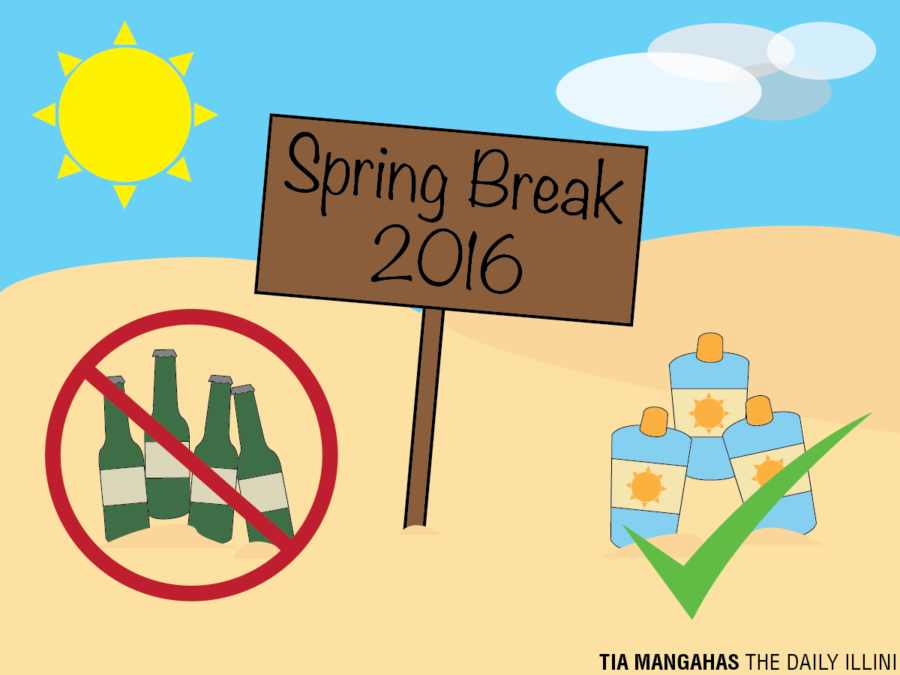Staying safe over spring break
February 11, 2016
Domonic Cobb, assistant provost for recruitment and retention, supervises many projects and committees from the Student Legal Services to the Tenant Union. However, his most recent notable effort is launching a campaign emphasizing spring break safety through a safety committee he is involved in. With this endeavor, Cobb and his associates hope to lessen the number of irresponsible incidents over break.
“I supervise student legal services, and we have a lot of people coming in after spring break or after Unofficial concerned about the mistakes they have made and their potential impact,” Cobb said. “Some of the temporary lapses in judgment result in arrest and, potentially, convictions.”
These momentary lapses in judgment can have an impact on the rest of one’s life and can even have an effect on later employment. Now starting with students staying on campus over spring break, there are some important things to consider when it comes to keeping safe.
“We ask them to use the same kind of common sense (and) awareness techniques while you’re here. Just employ more of them because it’s less populated, so there are less students to look out for you so you have to be vigilant,” Cobb said.
Get The Daily Illini in your inbox!
For students going abroad, there are some different safety concerns that should be addressed.
“(First), designating an emergency contact person; someone you can leave your itinerary with, your contact information, your ID numbers, information that should you lose that or get disconnected from it. You’ll know that you can contact someone who can provide you some assistance,” Cobb said.
Many of these safety guidelines may seem like they mirror the kind of things the faculty enforces here on campus, but that is because they are equally — if not more — important outside of campus where there may not be a campus police force or a student patrol. Staying in groups, being aware of one’s surroundings and looking out for one another, including oneself, is crucial to staying safe. Additionally, being prepared to travel is just as important.
“Before your travels, you’ve really got to be clear what visas or passports you need, particularly if you’re an international student,” Cobb said. “Every break it seems we have students who do not take care of their pre-travel responsibilities in a timely fashion.”
If a student happens to be taking a commercial flight to their destination, they will have to go through security at some point, and unless you are traveling by private jet, there are a few strict rules that students should be aware of in order to ensure a smooth transportation experience.
According to the TSA website, liquid items that are in containers larger than 3.4 ounces should be packed as opposed to bringing them in a carry-onmp. However, medications are an exception to this rule. Regardless of whether they exceed that limit, just separate them from the carry-on during screening so TSA agents don’t have to open the carry-on.
After arriving at one’s destination, it can be easy to just become disconnected and indifferent to one’s decisions, which can result in mistakes. One of the most common of these negligent mistakes is the excessive consumption of alcohol.
“You put yourself in harm’s way when you consume alcohol illegally. If you are drinking alcohol, you should eat, you should stay hydrated,” Cobb said. “You can download an app that can help you track your alcohol consumption.”
Before students actually leave campus, there are a few safety precautions that will allow them to sleep better at night, knowing their things are safe.
“Reduce the likelihood of break-ins by locking all doors and windows and locking up valuables, if possible,” said Kimberly Rice, sexual health educator at McKinley Health Center. “If you are driving to your destination … if you feel tired, switch drivers often and stay alert to reach your destination safely.”
Different vacation locations often pose their own unique safety concerns that should be aptly dealt with. For example, sunny locations are among the most popular spring break destinations, and students should take into account the effects of overexposure to the sun.
“Wear sunscreen, SPF 15 or higher, at all times,” Rice said. “The sun is most potent between the peak hours of 10 a.m. to 2 p.m., but reapply sunscreen throughout the day for maximum protection. Take breaks out of the sun to avoid overexposure and stay hydrated with water.”
None of these safety precautions should be overwhelming, nor should they stifle the overall enjoyment of one’s break. Without the implementation of some of these simple tips, the entire spring break could be negatively affected. Even something as simple as a nasty sunburn can make a family vacation even more excruciating, so block up.
“Stay sober, keep your wits about you, and make sure that you’re making responsible decisions,” Cobb said.







